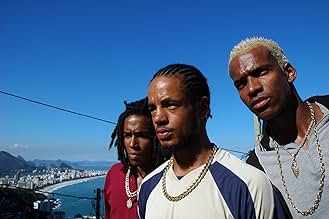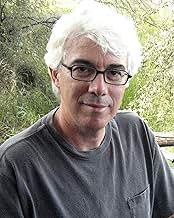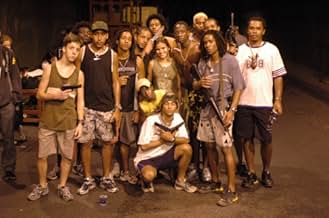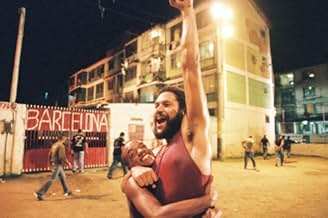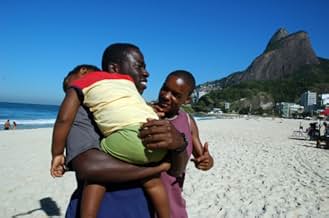NOTE IMDb
7,2/10
17 k
MA NOTE
Ajouter une intrigue dans votre langueBest buddies Acerola and Laranjinha, about to turn 18, discover things about their missing fathers' pasts which will shatter their solid friendship, in the middle of a war between rival drug... Tout lireBest buddies Acerola and Laranjinha, about to turn 18, discover things about their missing fathers' pasts which will shatter their solid friendship, in the middle of a war between rival drug gangs from Rio's favelas.Best buddies Acerola and Laranjinha, about to turn 18, discover things about their missing fathers' pasts which will shatter their solid friendship, in the middle of a war between rival drug gangs from Rio's favelas.
- Réalisation
- Scénario
- Casting principal
- Récompenses
- 14 nominations au total
Naima Silva
- Camila
- (as Naíma Silva)
Eduardo 'BR' Piranha
- Nefasto
- (as Eduardo BR)
Avis à la une
This sepia-sunbleached feature derives from, and features the same main characters as, the eponymous 2002-2005 Brazilian TV series about (mostly) boys in the "favela" hill ghettos above Rio for which Morelli did some of the writing and directing. The series, starring Darlan Cunha as Laranjinha (Wallace) and Douglas Silva as Acerola (Ace) --growing up from year to year and episode to episode--sort of grew out of the Fernando Meirelles/Kátia Lund film, 'City of God,' which in turn was based on Paulo Lins' tumultuous and partly autobiographical novel about three decades in the slums and the involvement of youth as dealers, assassins, and victims. Actually the Ace/Wallace characters as young teenagers, always played by Silva and Cunha, predate 'City of God' by two years; they appeared in a short film called 'Palace II' in 2000. The history of these films and stories is as intricate as the world they depict. Douglas Silva was the prepubescent tough in 'City of God' known by he moniker Dadinho--Lil' Dice.
'City of Men' is warmer and more intimate than the original film. 'City of God' has been both admired for its virtuosity--it's full of tours de force of visual violence and equally brilliant feats of rapid storytelling--and condemned as reveling too much in blood and gore, making teenage killers who terrorize neighborhoods into little glamor boys. That's quite true. It's unfortunately also true that in the ghettos of Rio as of other places such as the USA, young gun-toting drug dealers are the sexy local pop stars. Maybe the earlier film fails to take a sufficiently clear moral stand, or too much reflects the viewpoints of the young favela males it depicts. Nonetheless it's exhilarating film-making. Paradoxically, it also has a more positive arc than 'City of Men,' because its hero works his way out of the slums and into mainstream Rio de Janeiro to become a photojournalist. In 'City of Men,' nothing like that happens. Instead, there is a difficult reconciliation between the two boys, on the brink of eighteen, despite a stunning revelation about their lost fathers, and one of the fathers comes back into the picture and, reluctantly at first, chooses to be a warm presence in the life of his son. Both of the boys endure moments of terrible loneliness and isolation, which reveal how isolating the world of shifting and dangerous loyalties and hills fought for and lost is for a boy who in the first place lacks parents. But the focus is on the reconciliations.
In the TV series, the boys are in school. They face difficulties even showing up, and only one of them, Ace (Silva) really hits the books (he's also fascinated by guns of all kinds). Laranjinha is closer to turning into a young hood.
Thugh the new movie 'City of Men' is less specific than the TV series (judging by the DVD collections of episodes that I've seen) and suffers a bit by comparison with either it or 'City of God,' the vibrancy of the life on offer in all these films is still unmistakable, as well as the attractiveness of the young actors, the warmth of the world evoked--and vernacular swiftness that of the filming and editing, which somehow is both relaxing and unnerving.
Wallace/Laranjinha is trying to find out who his real father is; he doesn't want "unknown" to be on the place for "father" on his papers. Acerola knows his father is dead, and he wants to know what happened. He's faced with the local problem from the other side. His wife Cris (Camila Monteiro) keeps leaving their toddler son Clayton (Vinicius Oliveira) with him to take care of. He doesn't want to accept the responsibility. But if he reneges on it, he'll leave Clayton in the same place he and Wallace are in. Ace abandons Clayton on the beach early on when Madrugadão (Midnight, Jonathan Haagensen), the gang leader of the hill where they live, risks assassination to descend on a super-hot day for a swim in the ocean. He also turns some flashy cartwheels and shows off his spectacular pecs. Madrugadão, like Wallace (i.e. Darlan Cunha), is handsome and charismatic. Ace is so childish he forgets his own son; but he rushes back and finds him. And when Cris gets a job in the wealthier city of São Paulo, Ace, with great difficulty, forces himself to take on the responsibility of raising Clayton.
Wallace (perhaps a bit too easily) finds his father, a bearded man named Heraldo (Rodrigo dos Santos), who has just gotten out of prison after serving fifteen years of a twenty-year sentence--for murder. Heraldo's beard cannot conceal the fact that he is not very mature. He hasn't shouldered the responsibilities of being a man. But he also carries the weight of suffering and gratitude.
When rival gang leader Fasto (Eduardo "BR" Piranha) takes over Midnight's territory on Dead End Hill, a new gang war breaks out right in the middle of Ace and Wallace's journey of self-discovery.
'City of Men' is a more tender, individual and grownup story than 'City of God'; from what I've seen of the TV series it grows out of, it's less specific and less witty. It works as a kind of antidote to the amorality one feels in 'City of God,' and its warmth is touching. Nor is it visually ineffective, or its sense of the milieu less rich--except. Except that it quite lacks the momentum and adrenaline-rush brilliance of 'City of God's' virtuoso film-making and editing, or the rich range of minor characters the latter has. It is a little bit meandering, and its fast jump-cut slides from scene to scene sometimes seem out of place. As the AV Club reviewer says, much has been gained in this new film, but much has been lost as well. Still 'City of Men' is well worth watching.
'City of Men' is warmer and more intimate than the original film. 'City of God' has been both admired for its virtuosity--it's full of tours de force of visual violence and equally brilliant feats of rapid storytelling--and condemned as reveling too much in blood and gore, making teenage killers who terrorize neighborhoods into little glamor boys. That's quite true. It's unfortunately also true that in the ghettos of Rio as of other places such as the USA, young gun-toting drug dealers are the sexy local pop stars. Maybe the earlier film fails to take a sufficiently clear moral stand, or too much reflects the viewpoints of the young favela males it depicts. Nonetheless it's exhilarating film-making. Paradoxically, it also has a more positive arc than 'City of Men,' because its hero works his way out of the slums and into mainstream Rio de Janeiro to become a photojournalist. In 'City of Men,' nothing like that happens. Instead, there is a difficult reconciliation between the two boys, on the brink of eighteen, despite a stunning revelation about their lost fathers, and one of the fathers comes back into the picture and, reluctantly at first, chooses to be a warm presence in the life of his son. Both of the boys endure moments of terrible loneliness and isolation, which reveal how isolating the world of shifting and dangerous loyalties and hills fought for and lost is for a boy who in the first place lacks parents. But the focus is on the reconciliations.
In the TV series, the boys are in school. They face difficulties even showing up, and only one of them, Ace (Silva) really hits the books (he's also fascinated by guns of all kinds). Laranjinha is closer to turning into a young hood.
Thugh the new movie 'City of Men' is less specific than the TV series (judging by the DVD collections of episodes that I've seen) and suffers a bit by comparison with either it or 'City of God,' the vibrancy of the life on offer in all these films is still unmistakable, as well as the attractiveness of the young actors, the warmth of the world evoked--and vernacular swiftness that of the filming and editing, which somehow is both relaxing and unnerving.
Wallace/Laranjinha is trying to find out who his real father is; he doesn't want "unknown" to be on the place for "father" on his papers. Acerola knows his father is dead, and he wants to know what happened. He's faced with the local problem from the other side. His wife Cris (Camila Monteiro) keeps leaving their toddler son Clayton (Vinicius Oliveira) with him to take care of. He doesn't want to accept the responsibility. But if he reneges on it, he'll leave Clayton in the same place he and Wallace are in. Ace abandons Clayton on the beach early on when Madrugadão (Midnight, Jonathan Haagensen), the gang leader of the hill where they live, risks assassination to descend on a super-hot day for a swim in the ocean. He also turns some flashy cartwheels and shows off his spectacular pecs. Madrugadão, like Wallace (i.e. Darlan Cunha), is handsome and charismatic. Ace is so childish he forgets his own son; but he rushes back and finds him. And when Cris gets a job in the wealthier city of São Paulo, Ace, with great difficulty, forces himself to take on the responsibility of raising Clayton.
Wallace (perhaps a bit too easily) finds his father, a bearded man named Heraldo (Rodrigo dos Santos), who has just gotten out of prison after serving fifteen years of a twenty-year sentence--for murder. Heraldo's beard cannot conceal the fact that he is not very mature. He hasn't shouldered the responsibilities of being a man. But he also carries the weight of suffering and gratitude.
When rival gang leader Fasto (Eduardo "BR" Piranha) takes over Midnight's territory on Dead End Hill, a new gang war breaks out right in the middle of Ace and Wallace's journey of self-discovery.
'City of Men' is a more tender, individual and grownup story than 'City of God'; from what I've seen of the TV series it grows out of, it's less specific and less witty. It works as a kind of antidote to the amorality one feels in 'City of God,' and its warmth is touching. Nor is it visually ineffective, or its sense of the milieu less rich--except. Except that it quite lacks the momentum and adrenaline-rush brilliance of 'City of God's' virtuoso film-making and editing, or the rich range of minor characters the latter has. It is a little bit meandering, and its fast jump-cut slides from scene to scene sometimes seem out of place. As the AV Club reviewer says, much has been gained in this new film, but much has been lost as well. Still 'City of Men' is well worth watching.
It has been estimated that 19 percent of the population of Rio de Janeiro live in favelas, shanties crowded onto hillsides not far from luxurious apartments and world famous beach resorts. Notorious breeding grounds for poverty, drug addiction, and gang warfare, the favelas with their picturesque street names such as Dead End Hill, have been the subject of critically acclaimed films such as Hector Babenco's Pixote and Fernando Meirelles' City of God. Based on a long running television series that ran on Brazilian TV Globo for four years and was watched by 35 million viewers, Paolo Morelli's City of Men is a follow-up to the more flashy Meirelles film. While it lacks the earlier work's kinetic energy, it is more emotionally satisfying and has characters that we care about.
The film focuses on two friends, both turning 18 and without fathers. The two boys, Acerola and Laranjinha, (given Americanized names Ace and Wallace in the subtitles) have unresolved father issues. Wallace is trying to locate the father he never knew and Ace wants to find out how and why his father was killed. Actors Douglas Silva and Darlan Cunha both appeared in the TV series and footage from the TV series is used for flashbacks in the film, shown in a faded color palette. Both are natural actors who do a remarkable job. Ace, though only 18, lives with his wife Cris (Camilla Monteiro) in one of the shanties and is the father of a young boy named Clayton (Vinicius Oliveira). Ace is immature enough to leave Clayton alone on the beach in an early sequence but must grow up quickly and assume complete responsibility for Clayton's care when Cris takes a job in Sao Paolo.
Shot by cinematographer Adriano Goldman who provides sweeping panoramas of the hills, mountains, and beaches, the film begins on the top of Dead End Hill on a day so brutally hot I could feel the sweat gathering on my forehead. Gang members with handguns and automatic weapons led by Midnight (Jonathan Haagensen) decide to head down to the ocean, establishing a perimeter of guards who tell the cops that they are on route. The emotional center of the film is the relationship between Wallace and his newly discovered father Heraldo played with strength and dignity by Rodrigo Dos Santos. Heraldo is out on parole after having served fifteen years of a twenty year sentence for robbery and murder. The circumstances of the murder that he committed becomes a central issue in the relationship between Ace and Wallace and secrets about both of their fathers' pasts threaten their friendship and lead to their involvement on different sides of a new eruption of gang violence.
Somewhat melodramatic but never manipulative or false, City of Men transcends the familiar format of hand-held camera hyperactivity and gangster clichés to become a tender and deeply affecting story about abandoned children and how the cycle is repeated from one generation to the next. While the film explodes into warfare between rival gangs led by Midnight and Fasto (Eduardo BR), it is devoid of typical heavily stylized and frenetic violence. Ace and Wallace are characters we get to know and identify with. We want them to defy the odds and survive until adulthood though the tragic history of life in the Rio slums is never far from our mind.
The film focuses on two friends, both turning 18 and without fathers. The two boys, Acerola and Laranjinha, (given Americanized names Ace and Wallace in the subtitles) have unresolved father issues. Wallace is trying to locate the father he never knew and Ace wants to find out how and why his father was killed. Actors Douglas Silva and Darlan Cunha both appeared in the TV series and footage from the TV series is used for flashbacks in the film, shown in a faded color palette. Both are natural actors who do a remarkable job. Ace, though only 18, lives with his wife Cris (Camilla Monteiro) in one of the shanties and is the father of a young boy named Clayton (Vinicius Oliveira). Ace is immature enough to leave Clayton alone on the beach in an early sequence but must grow up quickly and assume complete responsibility for Clayton's care when Cris takes a job in Sao Paolo.
Shot by cinematographer Adriano Goldman who provides sweeping panoramas of the hills, mountains, and beaches, the film begins on the top of Dead End Hill on a day so brutally hot I could feel the sweat gathering on my forehead. Gang members with handguns and automatic weapons led by Midnight (Jonathan Haagensen) decide to head down to the ocean, establishing a perimeter of guards who tell the cops that they are on route. The emotional center of the film is the relationship between Wallace and his newly discovered father Heraldo played with strength and dignity by Rodrigo Dos Santos. Heraldo is out on parole after having served fifteen years of a twenty year sentence for robbery and murder. The circumstances of the murder that he committed becomes a central issue in the relationship between Ace and Wallace and secrets about both of their fathers' pasts threaten their friendship and lead to their involvement on different sides of a new eruption of gang violence.
Somewhat melodramatic but never manipulative or false, City of Men transcends the familiar format of hand-held camera hyperactivity and gangster clichés to become a tender and deeply affecting story about abandoned children and how the cycle is repeated from one generation to the next. While the film explodes into warfare between rival gangs led by Midnight and Fasto (Eduardo BR), it is devoid of typical heavily stylized and frenetic violence. Ace and Wallace are characters we get to know and identify with. We want them to defy the odds and survive until adulthood though the tragic history of life in the Rio slums is never far from our mind.
In the slum in Morro da Sinuca, a couple of days before turning eighteen year-old, Laranjinha (Darlan Cunha) tells his best friend and also orphan Acerola (Douglas Silva) that he misses his unknown father. Acerola decides to help his needy friend to find his father and they discover that he is in prison convicted for killing a man during a robbery and near to be released on parole. Meanwhile, Acerola's wife and babysitter Cris (Camila Monteiro) is invited to work in São Paulo and she sees the chance to raise money to buy a house of her own; she tells Acerola that he must take care of their son Clayton alone for one year. When the owner of the hill and Laranjinha's cousin Madrugadão (Jonathan Haagensen) is betrayed by his right-hand Nefasto (Eduardo BR), he is expelled from the slum and Laranjinha and Acerola have also to leave the hill. While Madrugadão plots a plan to invade and recover the hill with the support of the gang of the drug lord from Morro do Careca, Acerola and Laranjinha unravel the past of their fathers.
"Cidade dos Homens" follows the success of "Cidade de Deus" showing the life in one of the slums of Rio de Janeiro through the personal drama of the two lead teenagers, having as background the war between the rival gangs. The story is very realistic and the cast is amazingly natural in their performances, therefore the work of the writers and the director Paulo Morelli are awesome. The cinematography is also top-notch, with landscapes from the hill and well-choreographed and impressive action scenes in the slum. The producers certainly have an agreement with the real drug lords and owner of the hill to shoot this great movie. My vote is eight.
Title (Brazil): "Cidade dos Homens" ("City of the Men")
"Cidade dos Homens" follows the success of "Cidade de Deus" showing the life in one of the slums of Rio de Janeiro through the personal drama of the two lead teenagers, having as background the war between the rival gangs. The story is very realistic and the cast is amazingly natural in their performances, therefore the work of the writers and the director Paulo Morelli are awesome. The cinematography is also top-notch, with landscapes from the hill and well-choreographed and impressive action scenes in the slum. The producers certainly have an agreement with the real drug lords and owner of the hill to shoot this great movie. My vote is eight.
Title (Brazil): "Cidade dos Homens" ("City of the Men")
Following the cult Brazilian TV series "City of Men" (2002-2005), Acerola (Douglas Silva) and Laranjinha (Darlan Cunha), two orphaned, teenage street kids living in Morro da Sinuca (one of Rio's 800+ favelas), are now about to turn eighteen and face the issues of adulthood. Fatherhood -- in a social milieu where most kids grow up fatherless -- is the key theme here: Acerola is now a teen dad who has to take care of his baby boy when his teen wife moves to São Paulo to work as a babysitter; and Laranjinha is on the search of the identity of his unknown father, only to discover he's alive and is an ex-convict on parole. On the background, the violent, destitute, lawless, drug-gang controlled life in Rio's favelas.
A sort of mix of Fernando Meirelles' (co-producer here) "City of God" in visual style and "Oliver Twist" in spirit, one of the major problems of "City of Men" is its contrived plot solutions: we have to deal with Acerola's impossibly fast finding of Laranjinha's father whereabouts. And Acerola's grandmother ending up homeless and abandoned by her family (in the film's phoniest solution). And trafficker Nefasto suddenly changing sides in the gang war; and Acerola's one-chance-in-a-million spotting trafficker Fiel still alive, and the phony solution linking Acerola's and Laranjinha's fathers in the past, etc.
Director Paulo Morelli -- who made the practically unseen "Preço da Paz" and the insipid "Viva Voz", and directed some episodes of the "City of Men" TV series -- comes from the publicity world, and it certainly shows. His images are (too) soigné: the black bodies have a golden shine, with pearly sweat drops and blazingly white teeth. He adopts cinéma-vérité style (in the camera-work, dialog, performances), now de rigueur in films dealing with "stark realities". Oscar-nominated editor Daniel Rezende ("City of God", "Motorcycle Diaries") tries to keep things moving fast so we don't have time to think about plot holes and contrivances. Antonio Pinto's music is beautiful but inexplicably old-fashioned for a movie about teenagers. On a positive note, the sound design and effects are superb.
The cast -- most of them from the TV series -- is asked to do more of the same. Douglas Silva (Acerola) relies on his intuitive acting and his big, expressive fish face. Jonathan Haagensen (as drug lord Madrugadão) again acts with his pout and bare torso in his usual laid back bad-boy style, looking suitably stoned. Babu Santana does his usual scenery-chewing in a bit as a trafficker. Camila Monteiro, Luciano Vidigal (a sensitive actor with an impossible part) and others repeat their TV roles. Eduardo BR as Nefasto suggests a blooming talent; Rodrigo dos Santos as Laranjinha's father has a great movie face, and first-timers Pedro Henrique (Caju) and Naíma Silva (Camila) are sensitively directed. The best is Darlan Cunha as Laranjinha: no-nonsense, nonplussed, witty and resourceful, his deadpan acting is the essence of the "carioca cool".
But there's something bothersome about "Cidade dos Homens": it's hard to concentrate on Acerola's sex troubles or Laranjinha's unlikely instant attachment to his shady father (are Rio's street kids really this naive?) when characters like Caju (the dim-witted, glamor-seeking teenager who joins the drug gang) or those really original characters -- the teenage girls that have "upgraded" from "gangsta molls" to becoming gangstas themselves -- screamed for attention and development. The fact is it's weird to take "City of Men" for its face value, i.e. a buddy-buddy movie with the favela drug war on the background, though we all know ordinary life somehow always goes on even in the most violent, crude realities.
By focusing on the personal problems of Acerola and Laranjinha, director Morelli and writer Elena Soárez ("House of Sand", "Eu Tu Eles", lending a sensitive touch to what could have been a stolid buddy movie) choose to concentrate on plot and characters, using a lot of big close-ups of the kids' faces so we won't be distracted by the hellish favela background -- and yet the "background" jumps right on our laps. Poverty, segregation, racism, drugs, guns and violence, the absence of schools, hospitals, formal employment or government assistance, the dire conditions of life in the favelas that affect over one million people in Rio are, in fact, the cause of most of Acerola and Laranjinha's "personal" problems. Maybe one day we'll all be desensitized enough to take that sort of background as routine scenery, but not right yet.
"City of Men" has a major asset, anyhow: the final scene is lyrical, ingenious and filled with humor -- it's a great finale for the successful series that dared put on Brazilian TV favela teenagers as protagonists, teenagers who usually just show up in movies and TV (and, many times, and tragically, in real life) as traffickers, junkies, thieves or corpses.
A sort of mix of Fernando Meirelles' (co-producer here) "City of God" in visual style and "Oliver Twist" in spirit, one of the major problems of "City of Men" is its contrived plot solutions: we have to deal with Acerola's impossibly fast finding of Laranjinha's father whereabouts. And Acerola's grandmother ending up homeless and abandoned by her family (in the film's phoniest solution). And trafficker Nefasto suddenly changing sides in the gang war; and Acerola's one-chance-in-a-million spotting trafficker Fiel still alive, and the phony solution linking Acerola's and Laranjinha's fathers in the past, etc.
Director Paulo Morelli -- who made the practically unseen "Preço da Paz" and the insipid "Viva Voz", and directed some episodes of the "City of Men" TV series -- comes from the publicity world, and it certainly shows. His images are (too) soigné: the black bodies have a golden shine, with pearly sweat drops and blazingly white teeth. He adopts cinéma-vérité style (in the camera-work, dialog, performances), now de rigueur in films dealing with "stark realities". Oscar-nominated editor Daniel Rezende ("City of God", "Motorcycle Diaries") tries to keep things moving fast so we don't have time to think about plot holes and contrivances. Antonio Pinto's music is beautiful but inexplicably old-fashioned for a movie about teenagers. On a positive note, the sound design and effects are superb.
The cast -- most of them from the TV series -- is asked to do more of the same. Douglas Silva (Acerola) relies on his intuitive acting and his big, expressive fish face. Jonathan Haagensen (as drug lord Madrugadão) again acts with his pout and bare torso in his usual laid back bad-boy style, looking suitably stoned. Babu Santana does his usual scenery-chewing in a bit as a trafficker. Camila Monteiro, Luciano Vidigal (a sensitive actor with an impossible part) and others repeat their TV roles. Eduardo BR as Nefasto suggests a blooming talent; Rodrigo dos Santos as Laranjinha's father has a great movie face, and first-timers Pedro Henrique (Caju) and Naíma Silva (Camila) are sensitively directed. The best is Darlan Cunha as Laranjinha: no-nonsense, nonplussed, witty and resourceful, his deadpan acting is the essence of the "carioca cool".
But there's something bothersome about "Cidade dos Homens": it's hard to concentrate on Acerola's sex troubles or Laranjinha's unlikely instant attachment to his shady father (are Rio's street kids really this naive?) when characters like Caju (the dim-witted, glamor-seeking teenager who joins the drug gang) or those really original characters -- the teenage girls that have "upgraded" from "gangsta molls" to becoming gangstas themselves -- screamed for attention and development. The fact is it's weird to take "City of Men" for its face value, i.e. a buddy-buddy movie with the favela drug war on the background, though we all know ordinary life somehow always goes on even in the most violent, crude realities.
By focusing on the personal problems of Acerola and Laranjinha, director Morelli and writer Elena Soárez ("House of Sand", "Eu Tu Eles", lending a sensitive touch to what could have been a stolid buddy movie) choose to concentrate on plot and characters, using a lot of big close-ups of the kids' faces so we won't be distracted by the hellish favela background -- and yet the "background" jumps right on our laps. Poverty, segregation, racism, drugs, guns and violence, the absence of schools, hospitals, formal employment or government assistance, the dire conditions of life in the favelas that affect over one million people in Rio are, in fact, the cause of most of Acerola and Laranjinha's "personal" problems. Maybe one day we'll all be desensitized enough to take that sort of background as routine scenery, but not right yet.
"City of Men" has a major asset, anyhow: the final scene is lyrical, ingenious and filled with humor -- it's a great finale for the successful series that dared put on Brazilian TV favela teenagers as protagonists, teenagers who usually just show up in movies and TV (and, many times, and tragically, in real life) as traffickers, junkies, thieves or corpses.
"Poverty, to be picturesque, should be rural. Suburban misery is as hideous as it is pitiable." Anthony Trollope
Whew! I'm out of breath following youth gangs in the favela of Rio as they fight for a city hill as if they were in WWII's Pork Chop battle. Machine guns rule; women do not (contrary to the stereotype of matriarchal Latin society). It may not be City of God, the frenetic precursor using two of the same actors, but it has the Battle of Algiers' claustrophobia, which had a better-appointed Kasbah yet the same feeling of people darting around corners to avoid ever present Death.
The two central characters, teenage boys trying to keep their friendship and families in tact while around them chaos rules, veer between themselves and annihilation as they fight off the temptation to carry weapons like their friends yet can't find a way to survive without guns. There is more, however, than just gang warfare because sub-textually director/writer Paulo Morelli identifies a root cause of the dislocationsabsentee fathers. (Heck, even the current Spiderwick uses this powerful ingredient.) Much of the film is dedicated to one of the boys finding his father and the other coming to terms with the murder of his. While the former is adequately explored, the latter could have used much more explanation for the boy's suddenly joining the gang's war. Could it have been the murder of his father? I can't tell you.
The requisite hillside shots of the Rio harbor help the figurative contrast between the rich Brazilian scenery and the squalor of the barrio. Both conditions, of course, help to emphasize the globally accurate distance between the have's and the have not's, a condition the present economic global downturn is exacerbating. City of Men is a city of all men, racing through the labyrinth of life trying to survive, and losing.
City of God is a movie that contradicts its name; City of Men is spot onGod help us.
Whew! I'm out of breath following youth gangs in the favela of Rio as they fight for a city hill as if they were in WWII's Pork Chop battle. Machine guns rule; women do not (contrary to the stereotype of matriarchal Latin society). It may not be City of God, the frenetic precursor using two of the same actors, but it has the Battle of Algiers' claustrophobia, which had a better-appointed Kasbah yet the same feeling of people darting around corners to avoid ever present Death.
The two central characters, teenage boys trying to keep their friendship and families in tact while around them chaos rules, veer between themselves and annihilation as they fight off the temptation to carry weapons like their friends yet can't find a way to survive without guns. There is more, however, than just gang warfare because sub-textually director/writer Paulo Morelli identifies a root cause of the dislocationsabsentee fathers. (Heck, even the current Spiderwick uses this powerful ingredient.) Much of the film is dedicated to one of the boys finding his father and the other coming to terms with the murder of his. While the former is adequately explored, the latter could have used much more explanation for the boy's suddenly joining the gang's war. Could it have been the murder of his father? I can't tell you.
The requisite hillside shots of the Rio harbor help the figurative contrast between the rich Brazilian scenery and the squalor of the barrio. Both conditions, of course, help to emphasize the globally accurate distance between the have's and the have not's, a condition the present economic global downturn is exacerbating. City of Men is a city of all men, racing through the labyrinth of life trying to survive, and losing.
City of God is a movie that contradicts its name; City of Men is spot onGod help us.
Le saviez-vous
- AnecdotesJonathan Haagensen, Mumuzinho and Thiago Martins are some of the actors returning after La cité de Dieu (2002), portraying new roles.
- GaffesWhen Camila is showing Wallace her hair and telling him where Ace is, a leg of the tripod holding the close up camera is visible on the right side in the wide shot of them.
- Bandes originalesFlor E O Espinho
(uncredited)
Written by Nelson Cavaquinho, Guilherme de Brito and Alcides Caminha
Originally recorded by Paulinho Moska
Sung by Rodrigo dos Santos (Heraldo) in the shower
Meilleurs choix
Connectez-vous pour évaluer et suivre la liste de favoris afin de recevoir des recommandations personnalisées
Détails
Box-office
- Montant brut aux États-Unis et au Canada
- 325 131 $US
- Week-end de sortie aux États-Unis et au Canada
- 130 579 $US
- 2 mars 2008
- Montant brut mondial
- 2 589 732 $US
- Durée1 heure 46 minutes
- Couleur
- Mixage
- Rapport de forme
- 1.85 : 1
Contribuer à cette page
Suggérer une modification ou ajouter du contenu manquant

Lacune principale
By what name was La cité des hommes (2007) officially released in India in English?
Répondre

![City Of Men [Cidade dos Homens]](https://m.media-amazon.com/images/M/MV5BMTIyMzgyNTUyMl5BMl5BanBnXkFtZTcwMzQ2NTc3MQ@@._V1_QL75_UX500_CR0)



